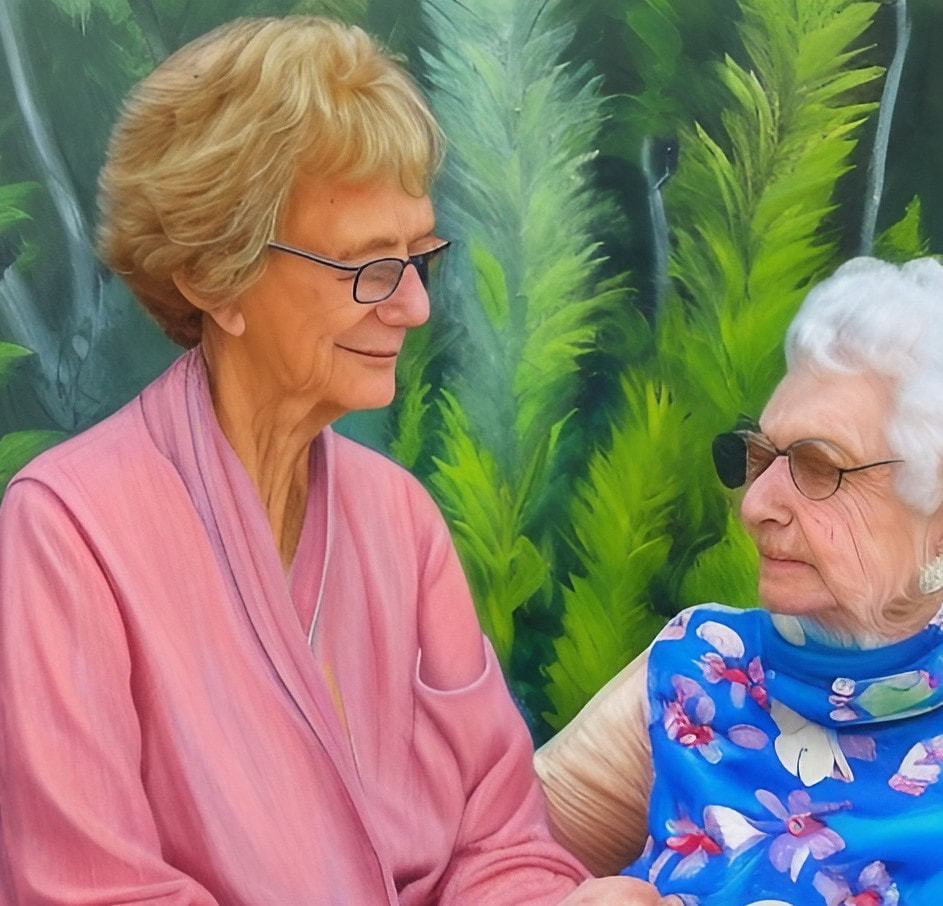|
When it comes to activities with a family member or friend who has Alzheimer’s disease, there are many options for engaging in meaningful activities that can be both fun and helpful. For instance, activities such as playing simple board games like checkers or dominos, listening to music, doing puzzles, looking at picture books and magazines together, playing simple card games like UNO or Go Fish!, going on short walks and picnics, gardening together and even simply talking can provide a great deal of comfort and connection while being both enjoyable and stimulating.
Engaging in these activities with your loved one will help boost their spirits and also give them an increased sense of purpose. Additionally, these more “mindful” activities have also been found to help reduce the risk of further decline in cognitive abilities. It is important to remember however that each individual with Alzheimer’s disease may experience different levels of functioning abilities so what works for one person may not work for another. This is why it is important to tailor the activity to their specific needs and preferences as much as possible in order to maximize the positive experience. Not only are engaging in activities beneficial for physical health but they can also be very beneficial for emotional well-being. By spending quality time engaging in meaningful activities with your loved one, you are showing them how much you care and taking part in something that could bring joy into their lives. Ways to remain connected and engaged with a person who has Alzheimer's One way to remain connected and engaged with a loved one who has Alzheimer's disease is by writing letters or sending cards. Writing letters or cards can be a great way to keep in touch, even if the person may not be able to reply. Writing a letter or card can be a way to let your loved one know that you are thinking of them, and it can also help to spark conversations when you meet in person. This is because, for many people with Alzheimer’s, reading familiar words brings back memories and can help stimulate their thoughts. Additionally, keeping up communication through small notes or cards provides family members with opportunities to reflect on past events and share stories from their lives which can provide both them and their loved ones with emotional support. Sending cards that include photos of family members or special places can also help create new memories for those living with Alzheimer’s disease as well as serve as reminders of how much they are loved by their family members. Furthermore, sending care packages filled with items related to hobbies such as puzzles or coloring books can provide a respite from daily routines while giving the person an activity that engages both the mind and body. This type of activity has been found to reduce agitation while providing moments of joy through stimulating conversation and activities. Fun and Engaging Activities to Enjoy with Loved Ones who have Alzheimer's Disease Activities such as playing board games like checkers, dominos, or even chess can help to create enjoyable experiences while stimulating a person's mind. It can also bring them back to their childhoods and the fond memories they experienced when playing these same games with their family or friends. Additionally, arts and crafts activities such as painting or drawing are also great activities to do together. These types of activities provide hours of entertainment as well as an opportunity for creative expression. They can also allow for conversation together as you are both working on the same project. Furthermore, research has shown that engaging in creative activities like these can improve communication skills, promote well-being, reduce stress levels, and increase feelings of self-worth. 30 activities to consider: 1. Playing board games 2. Arts and crafts activities 3. Gardening or landscaping (planting flowers, tending to a garden, etc.) 4. Going for walks together 5. Visiting nearby parks or gardens 6. Participating in local events such as fairs or festivals 7. Going out for meals together 8. Doing puzzles or crosswords together 9. Watching movies at home 10 Making music together or listening to music together 11. Cooking meals together and trying out new recipes 12. Going on shopping trips to look at interesting items 13. Completing house projects such as painting a room or building furniture 14. Doing yoga or light exercise together to improve physical health 15. Listening to audiobooks or stories that stimulate memories and conversations 16. Sketching or drawing pictures of old memories 17. Taking part in volunteer activities such as delivering food, or collecting donations 18. Attending concerts or plays at local theaters to enjoy the performing arts 19. Playing outdoor sports such as golf, tennis, swimming, or basketball 20. Visiting local landmarks and museums for a glimpse into the past 21. Exploring nature by going for hikes through forests and parks 22. Fishing at nearby lakes and rivers for an enjoyable outdoor experience 23. Planting a vegetable garden together to grow their own produce 24. Joining an art class where they can learn about different forms of art such as painting and sculpting 25. Watching documentaries about history and science topics that can spark conversations 26. Taking photographs of their favorite places together to capture special moments 27. Having regular potluck dinners with family and friends to socialize while enjoying delicious food 28. Write letters or send cards together 29. Embrace your inner child by coloring together with Adult coloring books 30. Enjoy a story by reading books out loud to each other The most important thing is to find activities that will provide your loved one with meaningful interactions while promoting joy and comfort. Additionally, it is also important to create a safe environment where they can feel comfortable, secure, and supported by their family members and caretakers. With the right approach and attitude, engaging in appropriate activities can be beneficial for all involved. Strategies for adapting activities for a person with Alzheimer's When engaging in activities with a loved one who has dementia, it is important to consider the stage of the disease they are in and adapt to their abilities. For instance, activities that involve more complex strategies such as certain board games may need to be simplified for someone in the early stages of dementia. On the other hand, someone in the later stages may struggle with even basic tasks like following directions or speaking clearly. For milder cases of dementia, activities should focus on engaging their physical and cognitive skills while still maintaining a sense of enjoyment and fun. Activities such as gardening, cooking, or cleaning can be broken down into smaller steps and repeated over time until they become second nature. This helps keep the mind active while still providing a sense of accomplishment when tasks are completed. Additionally, attending social gatherings with friends or family members can also provide an opportunity for meaningful interaction within a familiar environment. For moderate to severe cases of dementia, it is important to create an atmosphere that is calming yet stimulating for your loved one. Listening to soothing music or light exercise can be beneficial in helping them relax and reduce stress levels. Taking part in art classes or playing musical instruments can also provide a creative outlet where thoughts and emotions can be expressed without words. Furthermore, taking daily walks outdoors will not only help them stay physically active but also give them an opportunity to connect with nature which can have positive effects on moods and behavior. Adapting activities depending on the stage of dementia your loved one is experiencing will ensure that they are able to engage in meaningful activities while still feeling comfortable and secure within their environment. This will allow you both to experience joy together while creating lasting memories regardless of age or ability level. Overall, engaging in activities with a loved one who has dementia can be beneficial to both parties involved. It is important to create an atmosphere that is calming yet stimulating for your loved one while still providing meaningful interactions. Adapting activities depending on their stage of dementia will allow them to participate in enjoyable tasks while feeling secure within an environment they are familiar with. With the right approach, you can ensure that these moments together are filled with joy and happiness regardless of age or ability level. |
AuthorTyice Strahl Categories
All
Archives
May 2023
|
- Home
-
Settings
- Assisted Living
- Home Care
- Independent Living
- Memory Care
- Skilled Nursing
- Adult Family Homes
-
All Communities
>
- Aspen Quality Care
- Avamere South Hill
- Brighton Court
- Brookdale Nine Mile
- Brookdale Park Place
- Cheney Assisted Living
- Cherrywood Assisted Living
- Colonial Court
- Cornerstone Court
- Evergreen Fountains
- Palouse Country
- Fairview Assisted Living
- Fairwinds
- Fairwood
- Fieldstone Memory Care
- Good Samaritan
- Maplewood Gardens
- Moran Vista
- North Point Village
- Orchard Crest
- Pine Ridge Memory Care
- Emilie Court
- Ridgeview Place
- Riverview Retirement
- Rockwood Retirement Community
- Rose Pointe Assisted Living
- Royal Park
- South Hill Village
- Sullivan Park Assisted Living
- Sunshine Health Facilities
- Touchmark Assisted Living
- Willow Grove
- Wind River
- Alderwood Manor
- Franklin Hills
- Manor Care
- North Central Care Center
- Providence St Joseph
- Regency at Northpointe
- Royal Park Health and Rehabilitation
- Spokane Veterans Home
- The Gardens on University
- Spokane Assisted Living Directory
- Locations
- Services
- About
- Senior Living Blog
- Contact


 RSS Feed
RSS Feed
